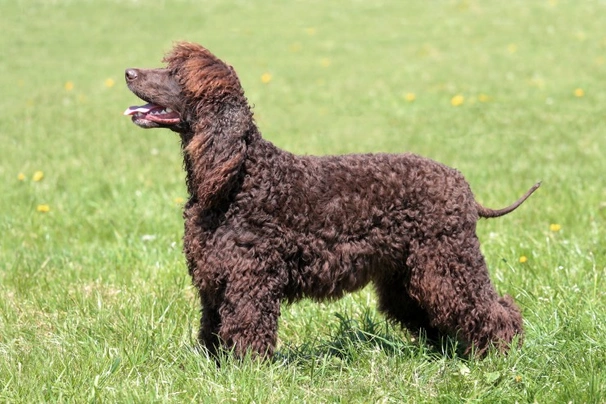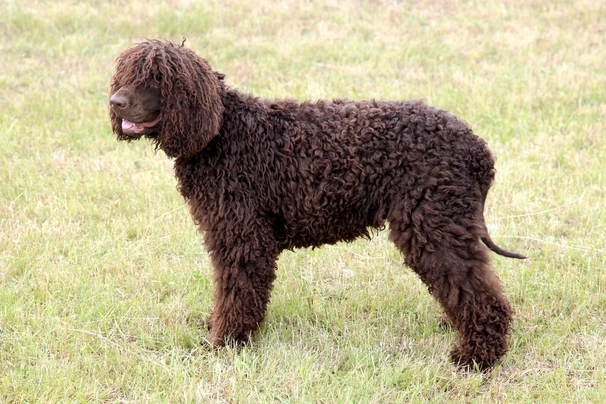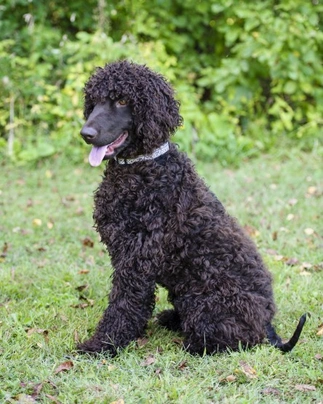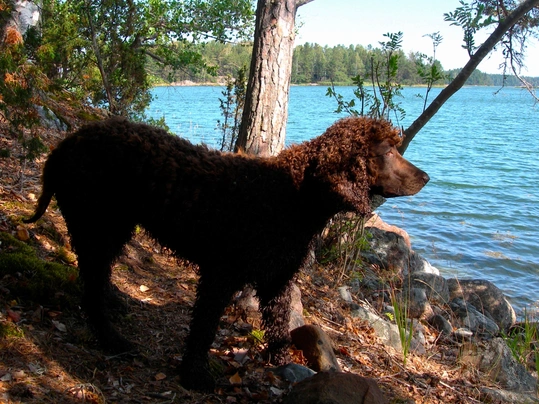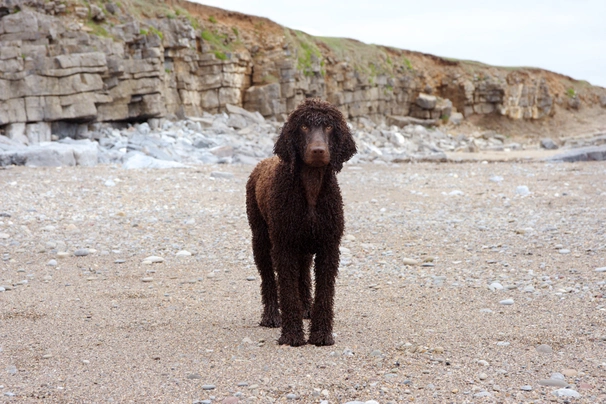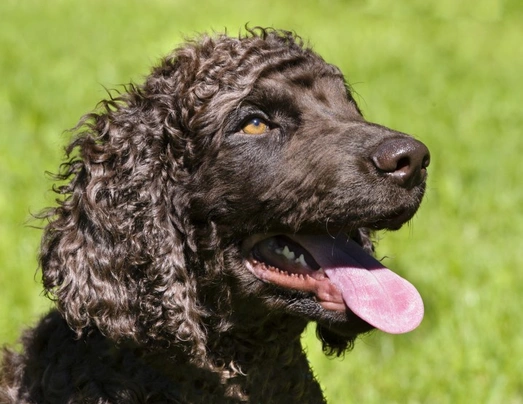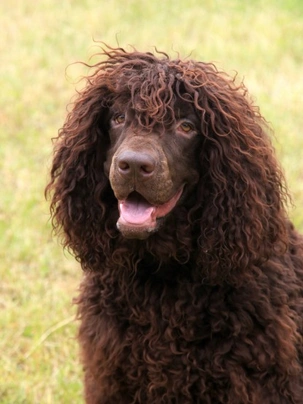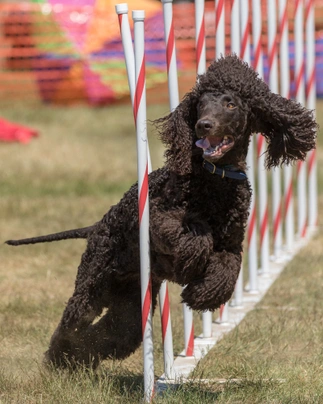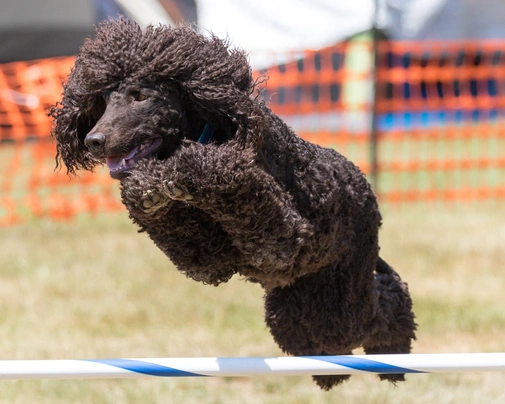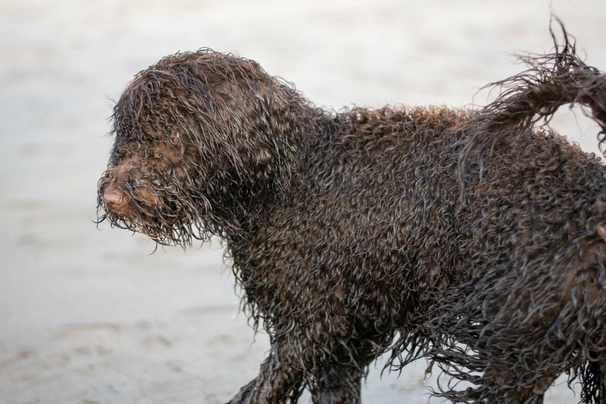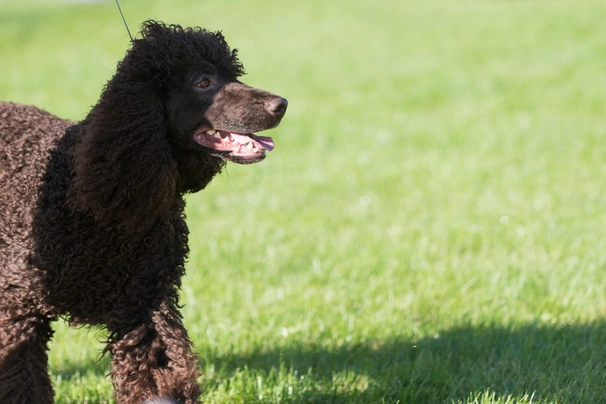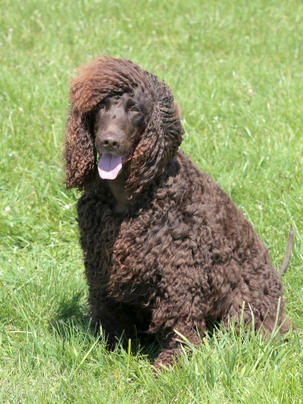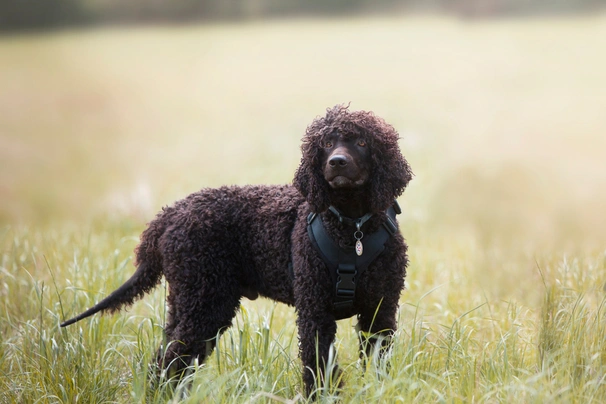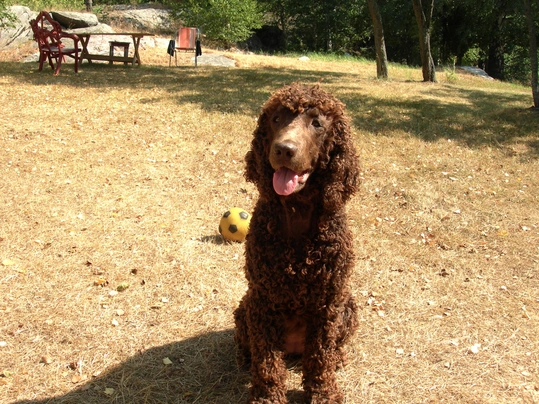Irish Water Spaniel
Pros
Cons
Introduction of the Irish Water Spaniel
The Irish Water Spaniel is an ancient breed and one of the tallest spaniels around. They were originally bred to retrieve water fowl and other game in more challenging marshland terrains. They boast a lovely dark liver coat that's made up of tight ringlets which cover the entire body except muzzles the front of a dog's neck and most of a dog’s tail which adds to their endearing appearance.
These charming dogs not only boast quite a unique coat but they are also known to have very kind and affectionate natures with the added bonus being they have a real sense of humour which makes them great fun to have around. The Irish Water Spaniel is an adaptable character being just at home in the field as they are in a family environment which is why the breed is finding fanbase in the UK as companions and family pets.
History of the Irish Water Spaniel
The actual origins and ancestry of the Irish Water Spaniel remain a bit of a mystery although there are records of "Water Dogs" in Persia that date as far back as 4000 BC. With this said the very first reference to dogs of a similar type in Ireland was in the mid 1800’s. However there are those who believe the breed came about when foreign fishermen bought their dogs with them to Ireland which included fishermen from France Italy Spain and Portugal. What is known is that all the Irish Water Spaniels we see today can trace their ancestry back to one dog named Boatswain a IWS owned by Justin McCarthy during the 1800's.
The breed became popular when they were exhibited for the first time in Birmingham in 1862. With this said Irish Water Spaniels were always highly prized in their native Ireland thanks to their kind natures and their natural instincts which in short meant they were extremely versatile in a hunting environment.
Here in the UK the Irish Water Spaniel is classed as a "spaniel" in the showring whereas when these dogs compete in any field trials they are classed as "retrievers". Today the Irish Water Spaniel has become a popular choice as both a companion dog and as a family pet with people who lead active outdoor lives and who are able to dedicate the time these dogs need to be truly happy well-rounded characters. Because they are so intelligent Irish Water Spaniels are also often used as therapy and PAT dogs but they are also used as detector dogs seeking out explosives and drugs.
Interesting facts about the breed
- Is the Irish Water Spaniel a vulnerable breed? Yes they have been added to the Kennel Club’s native vulnerable breed list and anyone wanting to share a home with an Irish Water Spaniel would need to register their interest with breeders
- Irish Water Spaniels have never had their tails docked
- They are often seen working as “detector dogs” thanks to their scenting abilities
- Finding well-bred healthy puppies can prove challenging and they tend to be expensive too
Appearance of the Irish Water Spaniel
Height at the withers: Males 53 - 58 cm Females 51 - 56 cm
Average weight: Males 25 - 30 kg Females 20 - 26 kg
Irish Water Spaniels have a very distinctive coat that helps these dogs stand out in a crowd. They have quite domed heads and long strong muzzles with a gradual stop. The hair on their faces is smooth with dogs having relatively small almond shaped eyes that can be medium to dark brown in colour. Dogs always have an intelligent and alert look about their eyes. Their ears are oval shaped and long being set low on a dog's head and hanging close to their cheeks.
The Irish Water Spaniel has a strong jaw with a perfect scissor bite where their upper teeth neatly overlap their lower ones. Their necks are strong and powerful with dogs holding them arched which adds to their noble appearance. Their shoulders slope but are powerful with dogs having reasonably deep wide chests and nice straight well boned front legs.
Their bodies are nicely proportioned with ribs being well laid back and well sprung. Backs are broad short and level with dogs boasting deep wide loins. Their hindquarters are also powerful with dogs having strong back legs and nice round large feet that are well covered in hair which includes in between the toes. An Irish Water Spaniel's tail is quite short and thicker at the root but it tapers to a fine point at the tip. It's set low and the base is covered in tight curls which stop abruptly. Dogs carry their tails straight out and never over their backs.
When it comes to their coat the Irish Water Spaniel boasts a mass of tight dense ringlets that cover most of their bodies and their coat is oily to the touch. Their front legs are covered with curls or ringlets down to their toes. However below a dog's hocks and on their back legs the hair is smooth at the front whereas it is curly on the back right down to a dog's feet. Dogs have a very pronounced "top knot" on their heads which is made up of long curls. Their ears are also covered in long ringlets. However the area around a dog's throat is smooth and it forms a very distinct V-shape from the back of their lower jaw down to the breast bone. The accepted breed colours for Kennel Club registration are as follows:
- Liver
- Liver Puce
It is worth noting that the accepted breed colours for Kennel Club registration may differ from the colours set out in the breed standard.
Gait/movement
When an Irish Water Spaniel moves they do so with a free gait showing a good reach and drive from behind. They have a rolling action that is typical of the breed thanks to their barrel-shaped rib cages.
Faults
The Kennel Club frowns on any exaggerations or departures from the breed standard and would judge the faults on how much they affect a dog's overall health and wellbeing as well as their ability to perform.
Males should have both testicles fully descended into their scrotums and it is worth noting that a dog can be a little lighter or heavier as well as slightly taller or shorter than set out in the Kennel Club breed standard which is only given as a guideline.
Temperament of the Irish Water Spaniel
Irish Water Spaniels are known to be "people" dogs loving nothing more than to please their owners whether they are working in the field or in a home environment. They form strong bonds with their families and don’t like being left on their own for even shorter periods of time. If they are left to their own devices these charming and attractive dogs can suffer from separation anxiety. They thrive on human contact and are therefore a great choice for people who lead active outdoor lives and like to have a canine companion at their side. They do well when they live in a household where one person usually stays at home when everyone else is out.
They are can be a little wary of people they do not know but an Irish Water Spaniel would rarely show any sort of aggressive behaviour towards a stranger preferring to just keep out of their way. They are courageous bold characters by nature and love nothing more than to be kept busy which means they are high-energy dogs that need a ton of mental stimulation and daily exercise to be truly happy well-rounded characters. The Irish Water Spaniel has a lot of stamina with the added bonus of them having a real sense of humour which means they are always ready to entertain and be entertained.
With this said an IWS is not the best choice for a first-time owner because they need to be trained and gently handled by someone who is familiar with the breed or they might start to show a more dominant side to their nature which can turn an Irish Water Spaniel into a more wilful character that's harder to manage.
Are they a good choice for first time owners?
As previously mentioned an Irish Water Spaniel is not the best choice for first time dog owners because they need to be well socialised handled correctly and trained from a young age by people who are familiar with the specific needs of this type of intelligent energetic dog. An IWS would quickly get the better of a novice owner which can make them harder to handle and live with.
What about prey drive?
Although Irish Water Spaniels are very social by nature they have working and hunting in their lineage and as such they have a very high prey drive. A IWS would happily chase anything that moves or tries to run away which means care must always be taken as to where and when a dog can run off the lead more especially if there is livestock and/or wildlife close by.
What about playfulness?
In the home environment an Irish Water Spaniel is known to be a playful and fun-loving character that loves to be involved in anything that goes on around them which involves playing games. However playtime can get a bit boisterous which means care should be taken when smaller children are around. They excel at all sorts of canine sports which includes agility and flyball to name but two of the activities they enjoy. Irish Water Spaniels are renowned for their resourcefulness when it comes to finding ways of amusing themselves and anyone else that’s around.
What about adaptability?
Irish Water Spaniels are highly adaptable dogs and providing they are given enough daily physical exercise combined with as much mental stimulation to prevent boredom from setting in they are just as happy in a home environment as they are working in the field. However they are not suited to living in an apartment because they benefit from being able to roam around in a secure back garden whenever possible so they can really let off steam.
What about separation anxiety?
Irish Water Spaniels form strong ties with their families and dogs are never very happy when they find themselves left on their own for longer periods of time. They are better suited to people who either work from home or in households where one person stays at home when everyone else is out so they are never alone for any length of time which could see a dog suffering from separation anxiety. This can lead to them being destructive around the home which is a dog's way of relieving any stress they are feeling and a way to keep themselves entertained which could include barking incessantly to get someone’s attention.
What about excessive barking?
Irish Water Spaniels are not known to be “barkers” with most dogs only voicing an opinion when they think it is necessary to alert an owner to something they don’t like is going on in their environment.
Do Irish Water Spaniels like water?
As their name suggests Irish Water Spaniels love swimming and will take to the water whatever the weather and as such care should always be taken when walking dogs off the lead anywhere near more dangerous watercourses just in case a dog decides to leap in and then needs rescuing because they cannot get out of the water on their own.
Are Irish Water Spaniels good watchdogs?
Although Irish Water Spaniels are friendly and social by nature they are good watchdogs and always quick off the mark when it comes to alerting an owner to when strangers are about although they would rarely do this aggressively preferring to keep their distance and bark.
Intelligence / Trainability of the Irish Water Spaniel
The Irish Water Spaniel is known to be highly intelligent they are not only quick on their feet but they learn new things extremely fast too. As such their training must start early and it must be consistent and always fair for these dogs to mature into well-behaved and obedient characters. It cannot be stressed enough the importance of early socialisation for an IWS. As soon as a dog has been fully vaccinated they need to be introduced to as many new situations people animals and other dogs as possible for them to grow up to be well-rounded adult dogs.
An Irish Water Spaniel is slow to mature which must be taken into account when they are being trained. It's best to take things slowly always showing an IWS a lot of patience and understanding to get the best results. They are sensitive dogs by nature and do not respond well to any sort of harsh correction or heavy-handed training but they do answer well to gentle positive reinforcement. Their training also must be as diverse as possible to keep an IWS focused because if things get too repetitive these intelligent dogs soon lose interest in a training session.
Irish Water Spaniel puppies like all puppies are incredibly cute which means it is all too easy to spoil them when they first arrive in their new homes. Puppies quickly grow up to be larger adult dogs which means as soon as a puppy is settled they must be taught the rules and boundaries as well as what is acceptable behaviours and what is not. This also helps establish a “pecking order” which is essential when dealing with an intelligent and often more dominant breed. The first commands a puppy must be taught are as follows:
- Come
- Sit
- Stay
- Heel
- Quiet
- Leave it
- Down
- Bed
Children and other
The Irish Water Spaniel boasts a loving and affectionate nature and as such they get on well with children of all ages. However any interaction between younger children and dogs should always be well supervised to make sure play time does not get too boisterous which could end up with someone getting scared or being hurt.
When well socialised from a young age an Irish Water Spaniel generally gets on well with other pets which includes the family cat. They are also known to get on well with other dogs. However an IWS would think nothing of chasing the neighbour's cat if they venture into a back garden.
Health of the Irish Water Spaniel
The average life expectancy of an Irish Water Spaniel is between 9 and 15 years when properly cared for and fed an appropriate good quality diet to suit their ages.
Like so many other breeds the IWS is known to suffer from a few hereditary health issues which are worth knowing about if you are planning share your home with one of these active and good-looking dogs. The conditions that seem to affect the breed the most include the following:
- Hip Dysplasia – dogs must be tested through the BVA/KC hip scoring scheme with the mean score for the IWS being 10 but parent dogs should be lower
- Elbow Dysplasia – dogs should be elbow tested through the British Veterinary Association (BVA) or the Animal Health Trust (AHT) Irish Water Spaniels with scores of 2 or 3 should not be used in a breeding programme
- Eye Scheme – dogs should be eye tested by a qualified veterinary ophthalmologist
- Cancer - lymphoma
- Thrombocytopaenia
- Addison’s Disease
- Cushing’s Disease
- Diabetes Mellitus
It is worth noting that the Kennel Club average COI for the Irish Water Spaniel currently stands at 3.5%.
What about vaccinations?
Irish Water Spaniel puppies would have been given their initial vaccinations before being sold but it is up to their new owners to make sure they have their follow-up shots in a timely manner with the vaccination schedule for puppies being as follows:
- 10 -12 weeks old bearing in mind that a puppy would not have full protection straight away but would be fully protected 2 weeks after they have had their second vaccination
There has been a lot of discussion about the need for dogs to have boosters. As such it's best to talk to a vet before making a final decision on whether a dog should continue to have annual vaccinations which are known as boosters.
What about spaying and neutering?
A lot of vets these days recommend waiting until dogs are slightly older before spaying and neutering them which means they are more mature before undergoing the procedures. As such they advise neutering males and spaying females when they are between the ages of 6 to 9 months old and sometimes even when a dog is 12 months old.
Other vets recommend spaying and neutering dogs when they are 6 months old but never any earlier unless for medical reasons. With this said many breeds are different and it is always advisable to discuss things with a vet and then follow their advice on when a dog should be spayed or neutered.
What about obesity problems?
As with other breed some Irish Water Spaniels gain weight after they have been spayed or neutered and it's important to keep an eye on a dog's waistline just in case they do. If a dog starts to put on weight it's important to adjust their daily calorie intake and to up the amount of exercise they are given. Older dogs too are more prone to gaining weight and again it's essential they be fed and exercised accordingly because obesity can shorten a dog's life by several years. The reason being that it puts a lot of extra strain on a dog's internal organs including the heart which could prove fatal.
What about allergies?
Some Irish Water Spaniels are prone to suffering from allergies and it's important for a dog to see a vet sooner rather than later if one flares up. Allergies can be notoriously hard to clear up and finding the triggers can be challenging. With this said a vet would be able to make a dog with an allergy more comfortable while they try to find out the triggers which could include the following:
- Certain dog foods that contain high levels of cereal and other grain-type fillers
- Airborne pollens
- Dust mites
- Environment
- Flea and tick bites
- Chemicals found in everyday household cleaning products
Participating in health schemes
All responsible IWS breeders would ensure that their stud dogs are tested for known hereditary and congenital health issues known to affect the breed by using the following schemes:
- Hip Dysplasia – dogs must be tested through the BVA/KC hip scoring scheme with the mean score for the IWS being 10 but parent dogs should be lower
- Elbow Dysplasia – dogs should be elbow tested through the British Veterinary Association (BVA) or the Animal Health Trust (AHT) Irish Water Spaniels with scores of 2 or 3 should not be used in a breeding programme
- Eye Scheme – dogs should be eye tested by a qualified veterinary ophthalmologist
What about breed specific breeding restrictions?
Apart from the standard breeding restrictions for all Kennel Club recognised breeds there are no other breed specific breeding restrictions in place for the Irish Water Spaniel.
What about Assured Breeder Requirements?
It is mandatory for all Kennel Club Assured breeders to use the following scheme on all their dogs and the KC strongly recommends that all other breeders follow suit:
Caring for the Irish Water Spaniel
As with any other breed Irish Water Spaniels need to be groomed on a regular basis to make sure their coats and skin are kept in top condition. They also need to be given regular daily exercise to ensure they remain fit and healthy. On top of this dogs need to be fed good quality food that meets all their nutritional needs throughout their lives.
Caring for an Irish Water Spaniel puppy
IWS puppies are boisterous and full of life which means it's essential for homes and gardens to be puppy-proofed well in advance of their arrival. A responsible breeder would have well socialised their puppies which always leads to more outgoing confident and friendly dogs right from the word go. With this said any puppy is going to feel vulnerable when they leave their mother and littermates which must be taken into account. The longer a puppy can remain with their mother the better although it should never be for too long either.
It's best to pick a puppy up when people are going to be around for the first week or so which is the time needed for a puppy to settle in. Puppy-proofing the home and garden means putting away any tools and other implements that a boisterous puppy might injure themselves on. Electric wires and cables must be put out of their reach because puppies love chewing on things. Toxic plants should be removed from flowerbeds and the home too.
Puppies need to sleep a lot to grow and develop as they should which means setting up a quiet area that's not too out of the way means they can retreat to it when they want to nap and it's important not to disturb them when they are sleeping. It's also a good idea to keep "playtime" nice and calm inside the house and to have a more active "playtime" outside in the garden which means puppies quickly learn to be less boisterous when they are inside.
The documentation a breeder provides for a puppy must have all the details of their worming date and the product used as well as the information relating to their microchip. It is essential for puppies to be wormed again keeping to a schedule which is as follows:
- Puppies should be wormed at 6 months old
- They need to be wormed again when they are 8 months old
- Puppies should be wormed when they are 10 months old
- They need to be wormed when they are 12 months old
Things you'll need for your puppy
There are certain items that new owners need to already have in the home prior to bringing a new puppy home. It's often a good idea to restrict how much space a puppy plays in more especially when you can't keep an eye on what they get up to bearing in mind that puppies are often quite boisterous which means investing in puppy gates or a large enough playpen that allows a puppy the room to express themselves while keeping them safe too. The items needed are therefore as follows:
- Good quality puppy or baby gates to fit on doors
- A good well-made playpen that's large enough for a puppy to play in so they can really express themselves as puppies like to do
- Lots of well-made toys which must include good quality chews suitable for puppies to gnaw on bearing in mind that a puppy will start teething anything from when they are 3 to 8 months old
- Good quality feed and water bowls which ideally should be ceramic rather than plastic or metal
- A grooming glove
- A slicker brush or soft bristle brush
- Dog specific toothpaste and a toothbrush
- Scissors with rounded ends
- Nail clippers
- Puppy shampoo and conditioner which must be specifically formulated for use on dogs
- A well-made dog collar or harness
- A couple of strong dog leads
- A well-made dog bed that's not too small or too big
- A well-made dog crate for use in the car and in the home that's large enough for a puppy to move around in
- Baby blankets to put in your puppy's crate and in their beds for when they want to nap or go to sleep at night
Keeping the noise down
All puppies are sensitive to noise including IWS puppies. It's important to keep the noise levels down when a new puppy arrives in the home. TVs and music should not be played too loud which could end up stressing a small puppy out making them withdrawn shy and timid.
Keeping vet appointments
As previously mentioned Irish Water Spaniel puppies would have been given their first vaccinations by the breeders but they must have their follow up shots which is up to their new owners to organise. The vaccination schedule for puppies is as follows:
- 10 -12 weeks old bearing in mind that a puppy would not have full protection straight away but would only be fully protected 2 weeks after they have had their second vaccination
When it comes to boosters it's best to discuss these with a vet because there is a lot of debate about whether a dog really needs them after a certain time. However if a dog ever needed to go into kennels their vaccinations would need to be fully up to date.
What about older Irish Water Spaniel when they reach their senior years?
Older Irish Water Spaniel need lots of special care because as they reach their golden years they are more at risk of developing certain health concerns. Physically a dog's muzzle may start to go grey but there will be other noticeable changes too which includes the following:
- Coats become coarser
- A loss of muscle tone
- Irish Water Spaniels can either become overweight or underweight
- They have reduced strength and stamina
- Older dogs have difficulty regulating their body temperature
- They often develop arthritis
- Immune systems do not work as efficiently as they once did which means dogs are more susceptible to infections
Older dogs change mentally too which means their response time tends to be slower as such they develop the following:
- They respond less to external stimuli due to impaired vision or hearing
- They tend to be a little pickier about their food
- They have a lower pain threshold
- Become intolerant of any change
- Often an older dog can feel disorientated
Living with an Irish Water Spaniel in their golden years means taking on a few more responsibilities but these are easily managed and should include looking at their diet the amount of exercise they are given how often their dog beds need changing and keeping an eye on the condition of their teeth.
Older IWS need to be fed a good quality diet that meets their needs at this stage of their lives all the while keeping a close eye on a dog's weight. A rough feeding guide for older dogs is as follows bearing in mind they should be fed highly digestible food that does not contain any additives:
- Protein content should be anything from 14 – 21%
- Fat content should be less than 10%
- Fibre content should be less than 4%
- Calcium content should be 0.5 – 0.8%
- Phosphorous content should be 0.4 – 0.7%
- Sodium content should be 0.2 – 0.4%
Older IWS don't need to be given the same amount of daily exercise as a younger dog but they still need the right amount of physical activity to maintain muscle tone and to prevent a dog from putting on too much weight. All dogs need access to fresh clean water and this is especially true of older dogs when they reach their golden years because they are more at risk of developing kidney disorders.
Grooming of the Irish Water Spaniel
An Irish Water Spaniel's coat is oily to the touch and is made of dense curls and ringlets that cover virtually their entire body. As such they are quite high maintenance on the grooming front. Ideally these dogs need to be brushed at least twice a week to prevent any matts or tangles from forming. Because their coats are so dense it is also important to check dogs over for ticks and fleas on a regular basis too.
Their coats need to be trimmed to keep things tidy and this includes trimming the hair between a dog's paw pads and the hair around their ears. It's also important to check a dog's ears on a regular basis and to clean them when necessary. If too much wax builds up in a dog's ears it can lead to a painful infection which can be hard to clear up. In short prevention is often easier than cure when it comes to ear infections.
Exercise of the Irish Water Spaniel
An Irish Water Spaniel is a high energy dog and therefore they need to be given a heap of physical exercise and mental stimulation every day for them to be truly happy well-rounded dogs. This means giving a dog a minimum of 2 hour's exercise a day. A shorter walk in the morning would be fine but a longer more interesting one in the afternoon is a must.
These dogs also like to be able to roam around a back garden as often as possible to really let off steam. However the fencing must be extremely secure to keep an IWS in because if they find a weakness in the fence they will soon escape out and get themselves into all sorts of trouble.
With this said Irish Water Spaniel puppies should not be given too much exercise because their joints and bones are still growing and too much pressure on them could result in causing a dog a few problems later in their lives. They should not be allowed to jump up or off furniture nor should they be allowed to run up and down the stairs because this puts too much pressure on their still growing joints and limbs.
Feeding of the Irish Water Spaniel
If you get an Irish Water Spaniel puppy from a breeder they would give you a feeding schedule and it's important to stick to the same routine feeding the same puppy food to avoid any tummy upsets. You can change a puppy's diet but this needs to be done very gradually always making sure they don't develop any digestive upsets and if they do it's best to put them back on their original diet and to discuss things with the vet before attempting to change it again.
Older dogs are not known to be fussy or finicky eaters but this does not mean you can feed them a lower quality diet. It's best to feed a mature dog twice a day once in the morning and then again in the evening making sure it's good quality food that meets all their nutritional requirements. It's also important that dogs be given the right amount of exercise so they burn off any excess calories or they might gain too much weight which can lead to all sorts of health issues. Obesity can shorten a dog's life by several years so it's important to keep an eye on their waistline from the word go.
Feeding guide for an Irish Water Spaniel puppy
Puppies need to be fed a highly nutritious good quality diet for them to develop and grow as they should. As a rough guide a IWS puppy should be fed the following amounts every day making sure their meals are evenly spread out throughout the day and it's best to feed them 3 or 4 times a day:
- 2 months old - 224g to 248g depending on puppy's build
- 3 months old - 266g to 302g depending on puppy's build
- 4 months old - 285g to 328g depending on puppy's build
- 5 months old - 291g to 349g depending on puppy's build
- 6 months old - 291g to 371g depending on puppy's build
- 8 months old - 254g to 335g depending on puppy's build
- 10 months old - 212g to 246g depending on puppy's build
Once a puppy is 12 months old they can be fed adult dog food.
Feeding guide for an adult Irish Water Spaniel
Once fully mature an adult IWS should be fed a good quality diet to ensure their continued good health. As a rough guide an adult Irish Water Spaniel can be fed the following amounts every day:
- Dogs weighing 20 kg can be fed 225g to 293g depending on activity
- Dogs weighing 25 kg can be fed 275g to 362g depending on activity
- Dogs weighing 26 kg can be fed 285g to 372g depending on activity
- Dogs weighing 30 kg can be fed 295g to 382g depending on activity
Irish Water Spaniel price
If you are looking to buy an Irish Water Spaniel you would need to pay anything from £400 to over £800 for a well-bred pedigree puppy. The cost of insuring a male 3-year-old IWS in northern England would be £23.43 a month for basic cover but for a lifetime policy this would set you back £44.71 a month (quote as of March 2018). When insurance companies calculate a pet's premium they factor in several things which includes where you live in the UK and a dog's age and whether they have been neutered or spayed amongst other things.
When it comes to food costs you need to buy the best quality food whether wet or dry to feed your dog throughout their lives making sure it suits the different stages of their lives. This would set you back between £40 - £50 a month. On top of this veterinary costs would need to be factored if for anyone wanting to share a home with an Irish Water Spaniel and this includes their initial vaccinations their annual boosters the cost of neutering or spaying your dog when the time is right and their yearly health checks all of which quickly adds up to over a £1000 a year.
As a rough guide the average cost to keep and care for an Irish Water Spaniel would be between £70 to £100 a month depending on the level of insurance cover you opt to buy for your dog but this does not include the initial cost of buying a well-bred healthy Kennel Club registered pedigree Irish Water Spaniel puppy.
Buying advice
When visiting and buying any puppy or dog there are many important things to consider and questions to ask of the breeder/seller. You can read our generic puppy/dog advice here which includes making sure you see the puppy with its mother and to verify that the dog has been wormed and microchipped.
Irish Water Spaniels can be hard to find and therefore healthy responsibly bred puppies can often command a lot of money. As such with Irish Water Spaniels there is specific advice questions and protocols to follow when buying a puppy which are as follows:
- Beware of online scams and how to avoid them. You may see online and other adverts by scammers showing images of beautiful Irish Water Spanielpuppies for sale at very low prices. However the sellers ask buyers for money up front before agreeing to deliver a puppy to a new home. Potential buyers should never buy a puppy unseen and should never pay a deposit or any other money online to a seller. You should always visit the pet at the sellers home to confirm they are genuine and make a note of their address.
- As previously touched upon Irish Water Spaniels have a fanbase in the UK although anyone wanting to share a home with one of these dogs would need to register their interest with breeders. With this said amateur breeders/people often breed from a dam far too often so they can make a quick profit without caring for the welfare of the puppies their dam or the breed in general. Under Kennel Club rules a dam can only produce 4 litters and she must be between a certain age to do so. Anyone wishing to buy an IWS puppy should think very carefully about who they purchase their puppy from and should always ask to see the relevant paperwork pertaining to a puppy's lineage their vaccinations and their microchipping.
